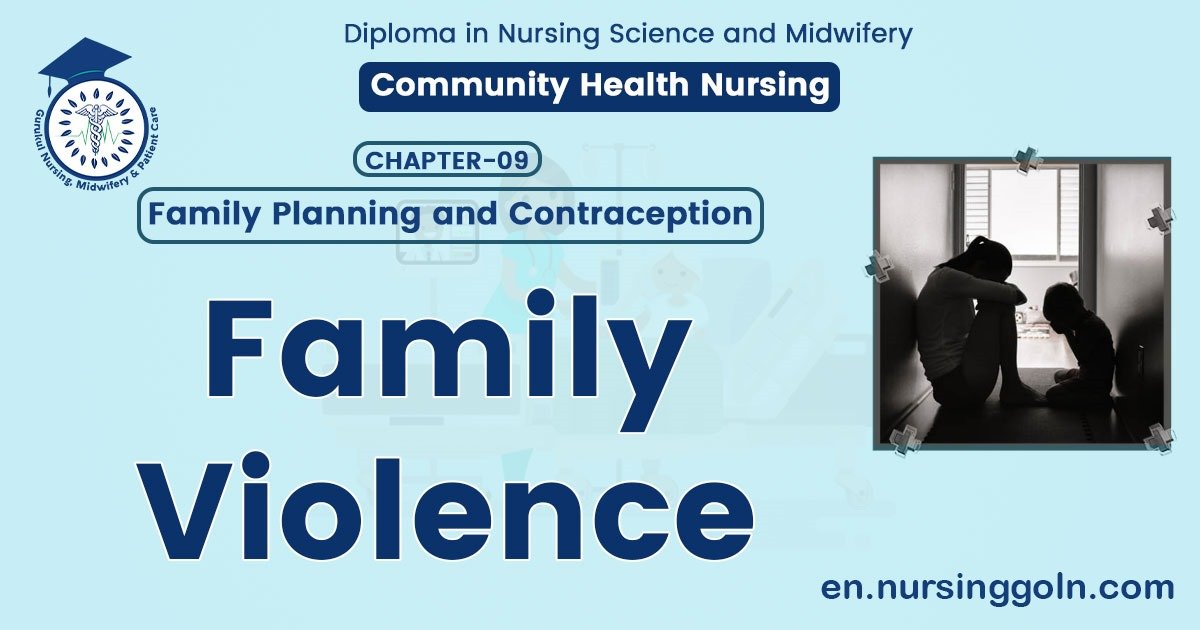Family violence – This book covers the entire syllabus of “Community Health Nursing” prescribed by the Universities of Bangladesh- for Basic and diploma nursing students. We tried to accommodate latest information and topics.
This book is examination friendly setup according to the teachers’ lectures and examination’s questions. At the end of the book previous university questions are given. We hope in touch with the book students’ knowledge will be upgraded and flourished. The unique way of presentation may make your reading of the book a pleasurable experience.

Family violence
Definition of family violence
Family violence is when someone uses abusive behaviour to control and/or harm a member of their family, or someone with whom they have an intimate relationship. Family violence includes many different forms of physical and emotional abuse, as well as neglect carried out by family members or intimate partners.
Or
Family violence as defined by the Women’s Charter as follows:
- willfully or knowingly placing or attempting to place a family member in fear of hurt
- causing hurt to a family member by an act which he or she ought to know would cause and result in hurt
- wrongful confining or restraining a family member against their will
- Causing continual harassment with intent to cause anguish to a family member, including verbal abuse, psychological or emotional abuse.
Or
The term family violence generally refers to violence inflicted by one family member against another. This can be violence between spouses, intimate partners, parents and their children, siblings, or even extended family members.
Risk factors of family violence
- Previously in an abusive relationship
- Poverty or poor living situations
- Unemployed
- Physical or mental disability
- Recently separated or divorced
- Isolated socially from family and friends
- Abused as a child
- Witnessed domestic violence as a child
- Pregnancy, especially if unplanned
- Younger than 30 years
- Stalked by a partner
- Low self-esteem
- Low income
- Low academic achievement
- Heavy alcohol and drug use
- Depression
- Antisocial personality traits
- Prior history of being physically abusive
- Unemployment
- Emotional dependence and insecurity
- Belief in strict gender roles (e.g., male dominance and aggression in relationships)
- Desire for power and control in relationships
- Economic stress
- Unhealthy family relationships and interactions
- Traditional gender norms
Nursing care of families with family violence
1. Nurses can be advocates for a nonviolent community and can teach and support members in reporting acts of violence.
2. The community nurse can advocate and each community residents to advocate for policy changes that would reduce violence.
3. Identify Victims of violence and provide interventions to reduce the likelihood of violence.
4. Identification of risk factors for assessing a person or a family s Potential violence.
5. Nurses can teach basic parenting skills, including acceptable ways to discipline children.
6. Nurses can helps or can actually serve as group leaders to provide information, support and encourage the people.
7. Nurses can helps people discuss the problems and seek alternatives for dealing with the tension chat led to the abusive situation.
8. Injured person must be placed in a safe location.
Prevention of family violence

- Find services and supports
- Inspiration awards
- Raise awareness
- Legislation
- Counselling and support for victims
- Men’s perpetrator behaviours change
- Children’s domestic and family violence counselling
- Use Social Media
- Interrupt sexist/homophobic and transphobic language
- Interrupt abuse
- Stop street harassment
- Come up with an action plan
- Recognize the role of gender in violence
- Stop Victim Blaming
- Stop rape culture
- Educate on the roots of violence
- Create safe spaces to discuss gender violence
- Stop stereotyping men’s and women’s roles
- Be Supportive
- Be aware of resources for girls and women
- Talk to others about ending violence and be a mentor.
